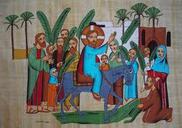
- Zachariah 9.10 (The Message)
READING:
When they had come near Jerusalem and had reached Bethphage, at the Mount of Olives, Jesus sent two disciples, saying to them, “Go into the village ahead of you, and immediately you will find a donkey tied, and a colt with her; untie them and bring them to me. If anyone says anything to you, just say this, ‘The Lord needs them.’ And he will send them immediately.” This took place to fulfill what had been spoken through the prophet, saying, “Tell the daughter of Zion, Look, your king is coming to you, humble, and mounted on a donkey, and on a colt, the foal of a donkey.”
The disciples went and did as Jesus had directed them; they brought the donkey and the colt, and put their cloaks on them, and he sat on them. A very large crowd spread their cloaks on the road, and others cut branches from the trees and spread them on the road. The crowds that went ahead of him and that followed were shouting, “Hosanna to the Son of David! Blessed is the one who comes in the name of the Lord! Hosanna in the highest heaven!”
When he entered Jerusalem, the whole city was in turmoil, asking, “Who is this?” The crowds were saying, “This is the prophet Jesus from Nazareth in Galilee.”
- Matthew 21.1-11 (NRSV)
REFLECTION:
When I was a child in the Deep South, I had no inkling of the passion of Jesus in any real sense. The southern-fried religion that reared me always jumped plum over the passion of Holy Friday and the execution of Jesus; straight from the glory of the Triumphal Entry to the Glory of the Resurrection; there was no conflict, vulnerability, suffering, and execution in between to raise disquieting questions and challenge the theology of triumphalism. With the Resurrection of Jesus, according to triumphalism, the Roman Empire was replaced by another; the Christian Empire. It’s Lord and Master would someday consummate this dominance on the battlefield of Armageddon and the violent destruction of God’s enemies. In fact, the only vague trace of passion was referenced in the abstract notion of Jesus’ blood shed for our sin.
This interpretation replaces passion with triumphalism, and in so doing obliterates the intimate connection between Holy Week and the ministry of Jesus. This connection is important, because the meaning of Holy Week becomes visible only when interpreted through the ministry that preceded it, and in a real sense caused it. You see, Jesus had two passions, and they shed light on each other. The first passion of Jesus – the one that inspired his vision and drove his every action – was the Reign of God (sometimes called the Kingdom of God); not an empire to replace Rome, but an alternative vision to challenge the very notion of empire.
Empire – in Jesus’ day represented by Rome - is based on dominating power, repression, violence, and exploitation, especially against the peasant class whose cause Jesus championed; while Jesus’ vision is based on liberating humility, recognition of the worth of all, and fairness toward all. Empire? Not so much; say rather anti-empire. It was this first passion that inevitably led Jesus into conflict with Rome, and brought its swift retribution of Jesus’ second passion: humiliation, scourging, and crucifixion.
On Sunday we will examine the Triumphal Entry of Jesus into Jerusalem in the light of its connection to his entire life and ministry, and his challenge to the notion of empire. It very well could be an eye-opening experience. I hope you will join us.

 RSS Feed
RSS Feed



